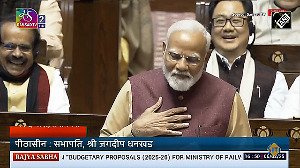The curtains may have come down on the World Economic Forum's annual meeting, but India's message to high-profile business leaders at the meet is still reverberating loud and clear -- you simply cannot ignore Asia's third largest economy.
"The message we are sending is that India is a fast growing economy, which presents enormous opportunities to countries as well as the business community. To foreign investors, the message is -- you can't afford not to invest in India," Finance Minister P Chidambaram, who led the Indian delegation to the WEF, told PTI in an interview in Davos.
"You can't afford not to engage India.... you can't afford not to have a trade agreement or work with India in a multi-lateral fora... India is on the move and you can't ignore us," he said.
Apart from addressing the WEF on various topics including global economic imbalances, Free Trade Agreements in Asia, India's manufacturing competitiveness and fast growing potential, Chidambaram had a tightly-packed schedule with meetings with top government officials of other nations, CEOs of global corporations and banks.
There was also a lesson to India, he said emphasising "other countries like China are stepping on the accelerator. Therefore, we need to move at a similar pace. Everybody recognised that we are aiming at the right direction," he said.
He also stressed on need for faster reforms, speedy infrastructure development and higher investment in farm sector to push up growth to 10 per cent.
Chidambaram, along with Commerce and Industry Minister Kamal Nath, also invited the global business community to come and invest in India and participate in the country's growth story.
They projected foreign direct investment inflows to double in two years to $10 billion from a little over $5 billion last fiscal. This fiscal, the FDI inflow was slated to be $7.5 billion.
Chidambaram outlined the need for massive investment, including FDI in infrastructure and rural sector to push up the GDP growth from over 7 per cent to 8 and further to 10 per cent in the next few years.
The minister invited FDI from global corporations, including those from Japan in the Rail Freight Corridor between Delhi-Mumbai and Delhi-Kolkata. He also said the government will soon invite expression of interest for five mega power projects.
Manufacturing was another area, where India showcased its competitiveness, as it invited investments in the rural sector, especially in food processing.
Nath went a step forward in projecting India as the future manufacturing hub of the world, especially for high end processes. After the success of business process outsourcing, he said India was poised for becoming the engineering and knowledge process outsourcing hub for the world.
The commerce minister shuttled from the venues of WEF and WTO mini-ministerial of trade ministers of leading nations while Planning Commission Deputy Chairman Montek Singh Ahluwalia was busy telling world leaders about India's growth plans.
Nath had been successful in pushing forward India's stance that developed nations need to cut farm subsidies before they seek market access in developing nations.
The mini-ministerial agreed on a time-line to help meet the deadline of resolving farm issues by April and non-farm issues by July.
WTO director general Pascal Lamy came out with a 'Work Programme' which stipulates that the issues launched in Doha Round of WTO negotiations in 2001, have to be resolved by this year.
"The US and EU have to move now," a jubilant commerce minister said, summing up the outcome of the mini-ministerial.
Both Nath and Chidambaram also voiced their concerns on global imbalances and the reverse flow of capital from developing nations like India and China to developed nations.
Chidambaram slammed the West for not addressing the global imbalances for which they themselves were responsible. He also said the rising interest rates in US, weakening of dollar and of course spiralling oil prices were affecting the developing nations.
While ministers were dealing on policy matters, India Inc demonstrated their calibre in the global arena. Reliance Industries chairman Mukesh Ambani and Infosys CEO Nandan Nilekani were active participants in the WEF.
The low profile Tata Cunsultancy Services CEO S Ramadorai showcased his company's prowess in becoming the technology partner of Fiat and providing engineering software solution to Ferrari racing car.
To sum up, it was "India Everywhere" at Davos thanks to the spadework of Confederation of Indian Industry and India Brand Equity Foundation, who brought the largest ever team of corporate bigwigs to this ski resort at Davos.






 © 2025
© 2025